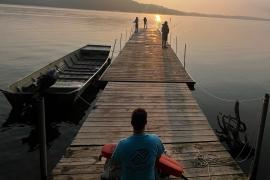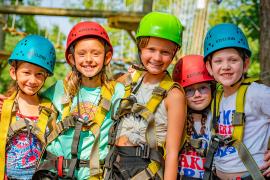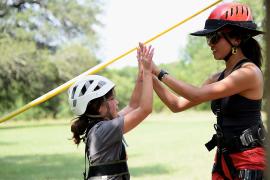The benefits of summer camp aren't just for our campers. Camp counselors gain professional skills and experience enormous growth while working at summer camp. As camp professionals, we have identified this growth for years. Unfortunately, the perception of working at camp doesn't often relay these benefits. And, if camp staff are aware of the benefits of working at camp, they can have difficulty communicating their skills and growth to people outside of camp. Ensuring that camp counselors realize the benefits of working at summer camp is an important piece to staff retention. Helping them successfully communicate how camp positively impacted them is vital to their ongoing success.
The Skills Learned
In recent years, I had identified that our camp counselors and staff were quite aware of the skills they learned while working at camp. They knew camp had a positive impact on them. But they weren't the best at discussing this in detail. I knew I had to do something to help our counselors and staff better communicate the skills learned at camp on their resumes and job applications. From that basic thought came this end-of-summer debriefing activity.
Prior to the activity you'll need to create "skills cards" that have the skills listed that are learned while working at camp. There are many that apply to all camps — leadership, communication, collaboration, problem-solving, persistence, empathy, risk assessment, emergency response, global awareness, etc. You may want to add others that are specific to your program or organization.
I created cards (3" x 2" note cards worked perfectly) with an assortment of skills (such as those given above) that can be developed at camp. Each card listed one skill. There were approximately 75 cards with skills; some skills repeated. Tailor this to your staff size. You want to have enough for two cards per person.
The American Camp Association has produced amazing resources as part of #ProjectRealJob. I use Translating Camp to Your Resume because it guides the user through the process of describing their job at camp in a way that admissions officers and future employers will understand. Each person will need a copy of this handout and something to write with. Additional items like flip chart paper and markers are hugely beneficial, but not required.
Working at Camp Isn't a Game
We know that working at camp isn't a game. It's serious stuff. However, the best learning at camp is done through games, interaction, and fun. Learning how camp counselors gain professional skills at camp should be no different. You'll want a meeting space that allows for mingling and open conversation among participants. There's no need for tables or chairs.
And now the fun begins...
At the start of the session, give each participant two skills cards. Once everyone has their cards, they find a partner. Each partner has 30 seconds to discuss how camp helped them develop one of the skills listed on their skills cards. Then each person trades a skill with their partner. The pairs separate and each person finds a new partner and they repeat the same 30-second sharing exercise. Continue this a couple of times, particularly if you have a group of 20 or more people. Make sure to end this introductory activity before people become bored with the discussion.
Next facilitate an open discussion about various skills people felt they gained. During this activity I asked people to share something that someone else learned while working at camp. During this part of the session I introduced the Project Real Job handout. When discussing the skills learned/developed I encouraged them to use examples of the "active language" to explain the work completed during the summer. This helped them to get in the mindset of using verbiage that most employers not only recognize, but seek when reviewing resumes/applications and assessing skills in interviews.
In the final step each staff member writes three concise statements (put on the back of the handout) regarding their job responsibilities over the summer, using the action words outlined on the handout. Remind them to consider all aspects of their job over the summer. Working at camp is a multifaceted job and camp counselors gain professional skills in all aspects of their job throughout the summer. Best of luck as you help your counselors and staff recognize and communicate the growth they experience while working at camp!
Alicia DeHart is the associate director of staff development at Fernwood Cove, a half-season girls camp in Maine. Her summer camp experience began as a camper, Teen Leader, and summer camp staff member at 4-H Camp in Virginia. As a seasonal camp counselor and activity instructor her experiences activity development and programming in aquatics, environmental education, and outdoor/adventure education for youth of all ages and backgrounds. Now in her fifteenth year as a camp director, she is passionate about personal growth and professional development of teens and young adults, particularly through summer camp. Alicia can be reached at [email protected].
This blog was written as part of Project Real Job’s initiative to support camps with staff recruiting, hiring, and retention efforts.
Photo courtesy of West End House Girls Camp in Parsonsfield, ME
The views and opinions expressed by contributors are their own and do not necessarily reflect the views of the American Camp Association or ACA employees.




